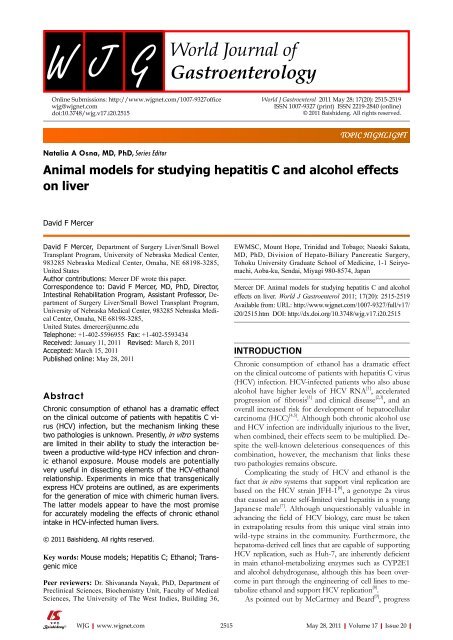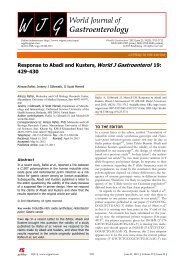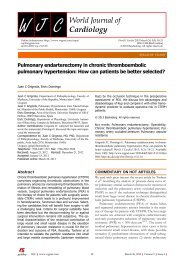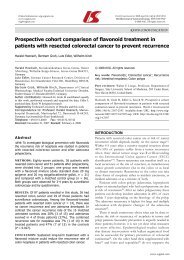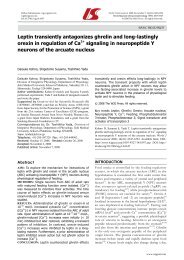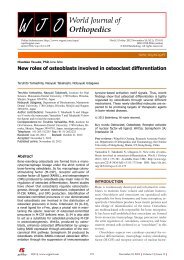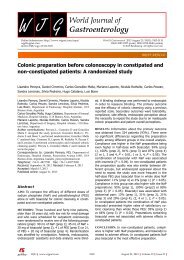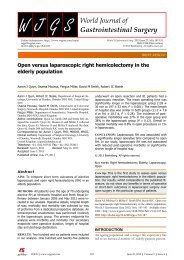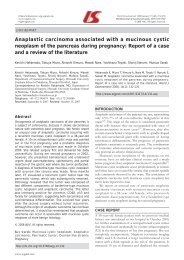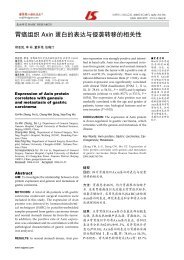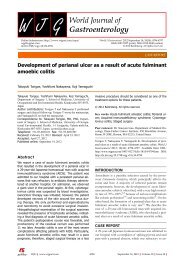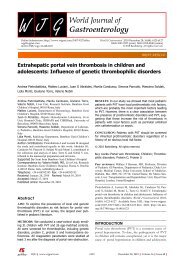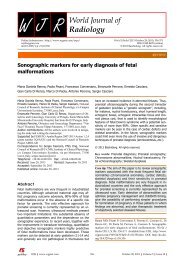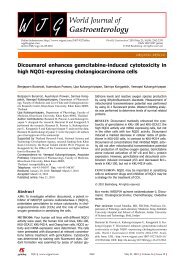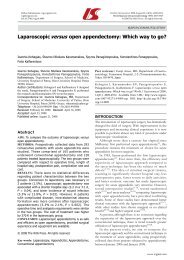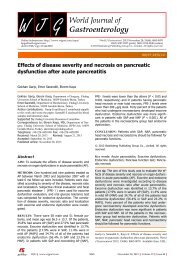20 - World Journal of Gastroenterology
20 - World Journal of Gastroenterology
20 - World Journal of Gastroenterology
Create successful ePaper yourself
Turn your PDF publications into a flip-book with our unique Google optimized e-Paper software.
Online Submissions: http://www.wjgnet.com/1007-9327<strong>of</strong>fice<br />
wjg@wjgnet.com<br />
doi:10.3748/wjg.v17.i<strong>20</strong>.2515<br />
Natalia A Osna, MD, PhD, Series Editor<br />
TOPIC HIGHLIGHT<br />
Animal models for studying hepatitis C and alcohol effects<br />
on liver<br />
David F Mercer<br />
David F Mercer, Department <strong>of</strong> Surgery Liver/Small Bowel<br />
Transplant Program, University <strong>of</strong> Nebraska Medical Center,<br />
983285 Nebraska Medical Center, Omaha, NE 68198-3285,<br />
United States<br />
Author contributions: Mercer DF wrote this paper.<br />
Correspondence to: David F Mercer, MD, PhD, Director,<br />
Intestinal Rehabilitation Program, Assistant Pr<strong>of</strong>essor, Department<br />
<strong>of</strong> Surgery Liver/Small Bowel Transplant Program,<br />
University <strong>of</strong> Nebraska Medical Center, 983285 Nebraska Medical<br />
Center, Omaha, NE 68198-3285,<br />
United States. dmercer@unmc.edu<br />
Telephone: +1-402-5596955 Fax: +1-402-5593434<br />
Received: January 11, <strong>20</strong>11 Revised: March 8, <strong>20</strong>11<br />
Accepted: March 15, <strong>20</strong>11<br />
Published online: May 28, <strong>20</strong>11<br />
Abstract<br />
Chronic consumption <strong>of</strong> ethanol has a dramatic effect<br />
on the clinical outcome <strong>of</strong> patients with hepatitis C virus<br />
(HCV) infection, but the mechanism linking these<br />
two pathologies is unknown. Presently, in vitro systems<br />
are limited in their ability to study the interaction between<br />
a productive wild-type HCV infection and chronic<br />
ethanol exposure. Mouse models are potentially<br />
very useful in dissecting elements <strong>of</strong> the HCV-ethanol<br />
relationship. Experiments in mice that transgenically<br />
express HCV proteins are outlined, as are experiments<br />
for the generation <strong>of</strong> mice with chimeric human livers.<br />
The latter models appear to have the most promise<br />
for accurately modeling the effects <strong>of</strong> chronic ethanol<br />
intake in HCV-infected human livers.<br />
© <strong>20</strong>11 Baishideng. All rights reserved.<br />
Key words: Mouse models; Hepatitis C; Ethanol; Transgenic<br />
mice<br />
Peer reviewers: Dr. Shivananda Nayak, PhD, Department <strong>of</strong><br />
Preclinical Sciences, Biochemistry Unit, Faculty <strong>of</strong> Medical<br />
Sciences, The University <strong>of</strong> The West Indies, Building 36,<br />
WJG|www.wjgnet.com<br />
2515<br />
<strong>World</strong> J Gastroenterol <strong>20</strong>11 May 28; 17(<strong>20</strong>): 2515-2519<br />
ISSN 1007-9327 (print) ISSN 2219-2840 (online)<br />
© <strong>20</strong>11 Baishideng. All rights reserved.<br />
EWMSC, Mount Hope, Trinidad and Tobago; Naoaki Sakata,<br />
MD, PhD, Division <strong>of</strong> Hepato-Biliary Pancreatic Surgery,<br />
Tohoku University Graduate School <strong>of</strong> Medicine, 1-1 Seiryomachi,<br />
Aoba-ku, Sendai, Miyagi 980-8574, Japan<br />
Mercer DF. Animal models for studying hepatitis C and alcohol<br />
effects on liver. <strong>World</strong> J Gastroenterol <strong>20</strong>11; 17(<strong>20</strong>): 2515-2519<br />
Available from: URL: http://www.wjgnet.com/1007-9327/full/v17/<br />
i<strong>20</strong>/2515.htm DOI: http://dx.doi.org/10.3748/wjg.v17.i<strong>20</strong>.2515<br />
INTRODUCTION<br />
Chronic consumption <strong>of</strong> ethanol has a dramatic effect<br />
on the clinical outcome <strong>of</strong> patients with hepatitis C virus<br />
(HCV) infection. HCV-infected patients who also abuse<br />
alcohol have higher levels <strong>of</strong> HCV RNA [1] , accelerated<br />
progression <strong>of</strong> fibrosis [1] and clinical disease [2,3] , and an<br />
overall increased risk for development <strong>of</strong> hepatocellular<br />
carcinoma (HCC) [4,5] . Although both chronic alcohol use<br />
and HCV infection are individually injurious to the liver,<br />
when combined, their effects seem to be multiplied. Despite<br />
the well-known deleterious consequences <strong>of</strong> this<br />
combination, however, the mechanism that links these<br />
two pathologies remains obscure.<br />
Complicating the study <strong>of</strong> HCV and ethanol is the<br />
fact that in vitro systems that support viral replication are<br />
based on the HCV strain JFH-1 [6] , a genotype 2a virus<br />
that caused an acute self-limited viral hepatitis in a young<br />
Japanese male [7] . Although unquestionably valuable in<br />
advancing the field <strong>of</strong> HCV biology, care must be taken<br />
in extrapolating results from this unique viral strain into<br />
wild-type strains in the community. Furthermore, the<br />
hepatoma-derived cell lines that are capable <strong>of</strong> supporting<br />
HCV replication, such as Huh-7, are inherently deficient<br />
in main ethanol-metabolizing enzymes such as CYP2E1<br />
and alcohol dehydrogenase, although this has been overcome<br />
in part through the engineering <strong>of</strong> cell lines to metabolize<br />
ethanol and support HCV replication [8] .<br />
As pointed out by McCartney and Beard [9] , progress<br />
May 28, <strong>20</strong>11|Volume 17|Issue <strong>20</strong>|


